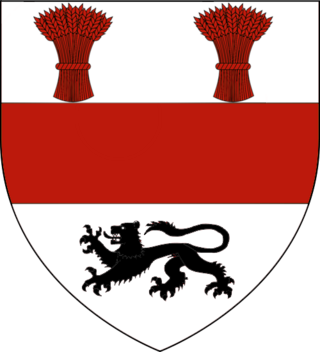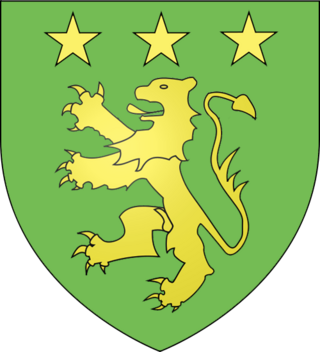Related Research Articles

Kinsella is a surname of Irish Gaelic origin, developed from the original form Cinnsealach, meaning "proud". The Kinsella sept is native in part of the modern County Wexford in Leinster, a district formerly called the Kinsellaghs. The oldest documentary mention of the surname appears in the Ancient Records of Leinster, dated to 1170, where the son of the King of Leinster is named as Enna Cinsealach. Originally pronounced KIN-səl-ə, it is also often found pronounced kihn-SEL-lə. This surname is most often found in Ireland, Northern Europe, Australia and New Zealand.
O'Farrell is an anglicised form of the Old Irish patronym Ó Fearghail. According to the historian C. Thomas Cairney, the O'Farrells were part of the Conmaicne Rein tribe in Ireland who came from the Erainn tribe who were the second wave of Celts to settle in Ireland from about 500 and 100 BC.
Ahern, also Aherne is an Irish surname. Variants of the surname include Ahearn(e) and Hearn(e). There are 2718 people with the surname Ahern in Ireland, and 1404 people in the United Kingdom. The variant Aherne is borne by 1480 people in Ireland and 919 people in the United Kingdom.

Moore is a common English-language surname. It was the 19th most common surname in Ireland in 1901 with 15,417 members. It is the 34th most common surname in Australia, 32nd most common in England, and was the 16th most common surname in the United States in 2000.
Horan is a surname that originated in County Galway, Ireland, and from there spread into County Mayo. According to historian C. Thomas Cairney, the O'Horans were one of the chiefly families of the Uí Mháine who in turn were a tribe of the Dumnonii or Laigin who were the third wave of Celts to settle in Ireland during the first century BC.
Considine is an Irish surname anglicised from the Gaelic form Mac Consaidín meaning "son of Consaidín" being derived from a foreign Christian name; meaning "son of Constantine". According to historian C. Thomas Cairney, the MacConsidines were one of the chiefly families of the Dal gCais or Dalcassians who were a tribe of the Erainn who were the second wave of Celts to settle in Ireland between about 500 and 100 BC. The family were based in Kingdom of Thomond, much of which later became County Clare. The ancestor of the family was Consaidín Ua Briain, a Bishop of Killaloe who died in 1194 and who was the son of Toirdhealbhach mac Diarmada Ua Briain. Notable people with the surname include:
Dinneen is an Irish surname. The family was famous for having supplied generations of court poets to their overlords in the ancient kingdom of Corcu Loígde. According to historian C. Thomas Cairney, the O'Dinneens were a chiefly family of the Corca Laoghdne who in turn came from the Erainn tribe who were the second wave of Celts who settled in Ireland from 500 to 100 BC. The Uí Duinnín were then hereditary historians to the MacCarthy Mór.
Dowling is an Irish surname. It is an anglicised form representing two unrelated clans:
Heffernan is an Irish surname derived from the Gaelic Ó hIfearnáin, which comes from the byname Ifearnán literally meaning 'little demon' or more metaphorically 'daredevil'. Heffernan gives rise to alternatives such as Heffernon and Hefferan. The name sometimes contains the O' prefix. According to historian C. Thomas Cairney, the O'Heffermans were the chiefly family of the Uaithni who were a tribe of the Erainn who were the second wave of Celts to settle in Ireland between about 500 and 100 BC.
O’Riordan is a surname of Irish origin. According to historian C. Thomas Cairney, the O'Riordans were one of the chiefly families of the Éile tribe who in turn came from the Dumnonii or Laigin who were the third wave of Celts to settle in Ireland during the first century BC.
O'Flanagan is an Irish surname.
O'Casey is a common variation of the Gaelic cathasaigh, meaning vigilant or watchful, with the added anglicized prefix O' of the Gaelic Ó, meaning grandson or descendant. At least six different septs used this name, primarily in the Counties of Cork and Dublin.
O'Hea may refer to:
Ó Gadhra or O'Gara is an Irish surname which originated in the kingdom of Luighne Connacht. Variants include Garry, Geary, Gerry, and Guiry.
Cullen is an Irish surname. It is an Anglicised form of Gaelic Ó Cuileáin 'descendant of Cuileán', a name meaning 'wolfhound whelp', 'young hound'. It is also considered by some to mean the 'handsome one'. The Uí Cuileáin of County Tyrone were erenaghs of Clogher. According to historian C. Thomas Cairney, the O'Cullanes were one of the chiefly families of the Uí Fidgenti who were a tribe of the Erainn who were the second wave of Celts to settle in Ireland between about 500 and 100 BC.
Ó Meachair or O'Meachair is a Gaelic Irish surname. Ó Meachair literally means grandson/descendant of the kind, generous or hospitable (Meachair). By the Irish name convention, this becomes "descendant of a kind, hospitable chief ". The Ó Meachair sept was part of the Ely O'Carroll clan and was concentrated in the areas of Kilkenny and Tipperary, notably the Barony of Ikerrin in Ireland.
Galvin (Gallivan) is a name of Irish extraction which originated as a Clare sept of the Dál Cais dynasty. According to historian C. Thomas Cairney, the O'Galvins were one of the chiefly families of the Dal gCais or Dalcassians who were a tribe of the Erainn who were the second wave of Celts to settle in Ireland between about 500 and 100 BC.
Ó hAonghusa is the surname of at least two distinct Gaelic-Irish families. It is now anglicised as Hennessy and Hennessey.
The surname O'Loughlin is an Anglicised form of the Irish Ó Lochlainn meaning "descendant of Lochlann". According to historian C. Thomas Cairney, the O'Loughlins were a chiefly family of the Corco Modhruadh tribe who in turn came from the Erainn tribe who were the second wave of Celts to settle in Ireland from about 500 to 100 BC.
Holohan is a surname of Irish Gaelic origin, from the Irish uallach meaning "proud".
References
- ↑ Michael C. O'Laughlin, The Book of Irish Families: Great & Small (Irish Roots Cafe, 2002: ISBN 0940134098), p. 66.
- ↑ Cairney, C. Thomas (1989). Clans and Families of Ireland and Scotland. Jefferson, North Carolina, United States, and London: McFarland & Company. p. 61. ISBN 0899503624.